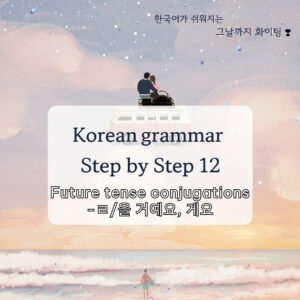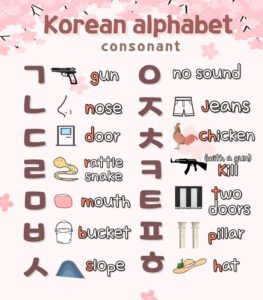-아/어/해 보이다, 지다 | looks like, a change of state
Today, we’re going to learn about two grammar patterns -아/어 보이다 and -아/어 지다 grammar!
First, 아/어/해 보이다 is used to express that someone or something seems, appears, or looks a certain way.
We’ll learn how to express a change in state, like ‘The weather has become dark’ or ‘I have gotten taller.’
These grammar points are similar to the previous one, 주다, so it shouldn’t be too difficult!
Part 1,
Let’s grasp the concept of grammar
아/어/해 보이다 : someone or something seems, appears, or looks a certain way.
The verb 보이다 literally means “to be seen” or “to be visible.” However, in everyday Korean, it often takes on the meaning of “to look” or “to appear.” When you combine 보이다 with adjectives, it expresses that someone or something looks a certain way!
How to Form “보이다 grammar”
To form 보이다, start by conjugating the main verb and then adding 보이다 to the verb stem. Here’s how it works:
We conjugate the verb into the present tense, remove “요,” and then add 보이다 (Same as the 주다 grammar!)
✨보이다 is mostly used with *adjectives.*
■ 행복하다 (to be happy) → 행복해 보이다 (to look happy)
■ 춥다 (to be cold) → 추워 보이다 (to seem/look cold)
■ 비싸다 (to be expensive) → 비싸 보이다 (to look/seem expensive)
■ 크다 (to be big) → 커 보이다 (to look/seem big)
■ 힘들다 (to be hard) → 힘들어 보이다 (to look harder/difficult)
🐻❄️ More examples 🐻❄️
For the present tense, 보이다 becomes 보여요.
예뻐 보여. (casual)
You look pretty.
맛있어 보여요.
It looks tasty.
걔들은 항상 행복해 보여요.
They always seem happy.
하늘이 흐려 보여.
The sky seems cloudy.
For the past tense, 보이다 becomes 보였어요.
걔 진짜 똑똑해 보였여.
He seemed really smart.
그 분 처음에 차가워 보였여.
He seemed cold at first.
너 발표할 때 긴장해 보였어.
You seemed nervous when you were presenting.
For the future tense, 보이다 becomes 보일 거예요.
그 웨딩드레스를 입으면 정말 예뻐 보일 거예요.
If you wear that wedding dress, you’ll look really pretty.
* 예쁘다 -> 예뻐요-> 예뻐 보여요-> 예뻐 보일 거예요!
아마 처음에는 쉬워 보일 거예요.
At first, it might look easy.
-> You can say 쉬워 보일 수도 있어요 as well.
(쉽다 + 보이다(looks) + ㄹ/을 수도 있다(might))
이 방에 페인트를 칠하면 훨씬 밝아 보일 거예요. (밝다: to be bright)
If you paint this room, it’ll look a lot brighter.
* 밝다 -> 밝아요-> 밝아 보여요-> 밝아 보일 거예요!
👻
Then you might be wondering, what’s the difference between -는 것 같아요 and 보이다? In our previous lesson (#20), we learned that -는 것 같아요 can also mean “it seems like” or “it looks like.”
Let’s take a look at how they differ:
는 것 같아요: Focuses on your guess or personal opinion about a situation.
Can be used more broadly with verbs, adjectives, or entire clauses.
아/어/해 보여요: Focuses on how something physically appears or visually looks.
Generally used with adjectives to describe the outward appearance.
Basically, the biggest difference is that -는 것 같아요 can be used with verbs and a variety of other expressions to indicate a guess or inference, while 보이다 is generally combined with adjectives to focus on how something physically or outwardly appears.
If you want to say “It seems like it’s raining”, you need to use -는 것 같아요 because “to rain” is a verb.
So 비가 오는 것 같아요 is correct, while 비가 와 보여요 is incorrect.
맛있어 보여요: “It looks delicious” (based on the food’s outward appearance).
맛있는 것 같아요: “It seems delicious” (for instance, after tasting it or inferring its taste).
Now, let’s take a look at 아/어/해 지다 Grammar!
아/어/해 지다 : to indicate a change of state.
지다 ending is often translated as “to become” or “to get” in English and is typically attached to adjectives to show that something or someone is transitioning into a new state or condition.
How to Form “지다 grammar”
To form 지다, start by conjugating the main verb and then adding 지다 to the verb stem. Here’s how it works:
We conjugate the verb into the present tense, remove “요,” and then add 지다 (Same as the 주다 grammar!)
✨지다 is mostly used with *adjectives.*
■ 행복하다 (to be happy) → 행복해지다 (to become happy)
■ 춥다 (to be cold) → 추워지다 (to get cold)
■ 비싸다 (to be expensive) → 비싸지다 (to become expensive)
■ 크다 (to be big) → 커지다 (to become big)
■ 힘들다 (to be hard) → 힘들어지다 (to become harder/more difficult)
🐻❄️ More examples 🐻❄️
> Past tense
머리가 길어졌어요.
My hair has gotten longer.
기분이 좋아졌어요.
I feel better / My mood got better.
문제가 복잡해졌어요.
The problem has gotten more complicated.
날씨가 따뜻해졌어요.
The weather became warm.
✓ To express the ‘have + verb’ tense in Korean, we use the simple past tense, since 지다 often indicates a change in state, like ‘it was this in the past, and now it’s this.’ It is commonly used with the past tense to express ‘have become’ or ‘have gotten.’
> Present / Future tense
기후변화가 나빠지고 있어요.
The climate change is getting worse. (-> indicating an ongoing change.)
날씨가 더워지고 있어요.
The weather is getting hotter.
시험이 어려워질 거예요.
The exam will become difficult.
나는 더 강해질 거예요.
I will get stronger.
It’s pretty simple and straightforward!
To indicate a change in state, we use the grammar -지다, which is mostly used with adjectives.
We also have a verb 되다, which means “to become,” but it’s used in a completely different context.
For example:
I became a CEO when I was 40: 40살에 사장이 됐어요.
I want to become rich: 부자가 되고 싶어요.
-지다 is an ending that attaches to adjectives to show a change in state, while 되다 is a verb that means “to become” and is used in different contexts. So, don’t get confused by these two!
Let’s sum up!
Lessons 27 and 28 work together like this:
Conjugate the verb/adjectives into its present tense form.
Attach 주다, 지다, or 보이다 depending on the meaning you want.
(Conjugated Adjectives) + 보이다: Expresses “it looks like…” or “it appears…” (Not typically used with verbs)
(Conjugated Verbs) + 주다: Used to mean “doing something for someone.” (Not typically used with adjectives)
(Conjugated Adjectives) + 지다: Indicates a change of state (e.g., “become…”). (Not typically used with verbs)
Perfect, now let’s practice! 🌻
Part 2,
Practice making sentences #1
1. The weather suddenly got cloudy! I think I should go buy an umbrella.
(suddenly: 갑자기 / to be cloudy: 흐리다 / umbrella: 우산)
2. The baby has grown so much(to become big) in just a month! It’s amazing.
(baby: 아기/ to grow: = to be big 크다 / one month: 한달 / amazing: 신기하다)
3. Houses in Korea keep getting more expensive.
(keep: 계속 / expensive: 비싸다)
4. He was an unknown actor, but they’ve become really famous recently
(unknown actor: 무명배우 / to be famous: 유명하다 / recently: 최근)
5. If you eat this, you’ll feel better. (casually!)
(feel better: 기분이 낫다)
6. It was really cold last month, but it’s gradually getting warmer now.
(to be cold: 춥다 / gradually: 점점 / to be warm: 따뜻하다)
7. After using that cream, my skin became so much softer.
(to use: 쓰다 / skin: 피부 / to be soft: 부드럽다)
8. The situation is gradually getting better. That’s a relief.
(The situation: 상황/ gradually: 점점 / to be better: 낫다 / to be a relief: 다행이다)
9. Studying Korean was hard at first, but it’s gotten easier over time. (casually!)
(at first: 처음에 / to be easy: 쉽다 / over time: 시간이 지나면서(as time passed)
10. It feels like the economy is getting worse, and it breaks my heart. (casually!)
(economy: 경제 / to be bad: 나쁘다 / to break someone’s heart: 마음이 아프다)
11. I think you’ll look really pretty in that outfit.
(outfit: 옷)
12. When I first saw it, it looked pretty difficult.
(pretty: 꽤)
13. When we first met, you seemed a bit nervous, so it was hard to start a conversation. (casually!)
(first: 처음 / to be nervous: 긴장되다 / start a conversation : 말(을) 걸다)
14. She is always smiling, so she looks very kind.
(to smile : 웃다 / kind: 착하다)
15. This food looks spicy, but I think it will taste good. (casually!)
(to be spicy: 맵다 / taste good: 맛있다)
Thy these on your own first, before checking the answers!
1. The weather suddenly got cloudy. I think I should go buy an umbrella.
(suddenly: 갑자기 / to be cloudy: 흐리다 / umbrella: 우산)
날씨가 갑자기 흐려졌어요. 우산 사러 가야 할 것 같아요.
• 흐리다 (to be cloudy) + 지다 (to have gotten/become) → 흐려지다.
Present: 흐려져요(is getting cloudy) | Past: 흐려졌어요(has gotten cloudy)
• Go somewhere to do something (purpose, in order to) Use the grammar (으)러.
If you’re not sure how it works, check here!
사다(to buy) + (으)러 → 사러
• 가야 해요 (have to go) + ㄹ/을 것 같아요 (I think I will) → 가야할 것 같아요 / 가야될 것 같아요.
2. The baby has grown so much(to become big) in just a month! It’s amazing.
(baby: 아기/ to grow: = to be big 크다 / one month: 한달 / amazing: 신기하다)
아기가 한달만에 엄청 커졌어요! 신기해요.
• 크다 (to be big) + 지다 (to have gotten/become) → 커지다.
Present: 커져요(is getting big) | Past: 커졌어요(has become big)
• in just a month -> 한달(a month) + 만(just, only) + 에(in) → 한달만에
• 엄청, 진짜, 정말 are commonly used in Korean to express “so much” or “really!”
3. Houses in Korea keep getting more expensive.
(keep: 계속 / expensive: 비싸다)
집값이 계속 비싸지고 있어요.
• 비싸다 (to be expensive) + 지다 (indicates a change of state) → 비싸지다.
This shows that something is becoming more expensive.
• To express the present continuous tense (be -ing), you can say:
비싸지고 있어요 or 비싸지는 중이에요.
• To express the idea of “keep” (continuously), simply add 계속 before the main verb:
Example: 계속 자요 (“I keep falling asleep”). 계속 먹고 있어요 (I keep eating)
4. He was an unknown actor, but they’ve become really famous recently
(unknown actor: 무명배우 / to be famous: 유명하다 / recently: 최근)
그 분은 무명배우였는데, 최근에 엄청 유명해졌어요.
• 유명하다 (to be famous) + 지다 (to have gotten/become) → 유명해지다.
• You can also say “무명배우였지만,” but “는데” is more commonly used. While 지만 translates to “however,” it has a slightly more formal and contrasting tone in Korean.
• He/She: 그 분 or 그 쪽 (Very polite) / 그 사람(neutral) / 걔 (informal)
5. If you eat this, you’ll feel better. (casually!)
(feel better: 기분이 낫다)
이거 먹으면, 기분이 나아질 거야!
• 낫다 (to be better) + 지다 (indicates a change of state) → 나아지다. (낫다 is a “ㅅ” irregular verb)
• 나아질 거예요 (formal) / 나아질 거야(casual)
6. It was really cold last month, but it’s gradually getting warmer now.
(to be cold: 춥다 / gradually: 점점 / to be warm: 따뜻하다)
지난달에 진짜 추웠는데, 지금 점점 따뜻해지고 있어요.
• To express the present continuous tense (be -ing), you can say:
따뜻해지고 있어요 or 따뜻해지는 중이에요.
7. After using that cream, my skin became so much softer.
(to use: 쓰다 / skin: 피부 / to be soft: 부드럽다)
그 크림 쓰고, 내 피부가 진짜 완전 부드러워졌어요.
• 부드럽다 is a “ㅂ” irregular verb. In the present tense, it becomes 부드러워요. Adding 지다 → 부드러워지다.
• To emphasize, you can combine words like 진짜, 정말, 완전 for extra impact.
• To express “after,” you can use the 고 grammar, which connects actions in sequence (e.g., 먹고 갈게요 = I’ll eat and then go).
8. The situation is gradually getting better. That’s a relief.
(The situation: 상황/ gradually: 점점 / to be better: 낫다 / to be a relief: 다행이다)
상황이 점점 나아지고 있어요. 다행이에요!
• 나아지고 있어요 or 나아지는 중이에요. Both are correct, but I personally use -고 있어요 more often 🙂
9. Studying Korean was hard at first, but it’s gotten easier over time. (casually!)
(at first: 처음에 / to be easy: 쉽다 / over time: 시간이 지나면서(as time passed)
한국어 공부하는 거 처음에 어려웠는데, 시간이 지나면서 쉬워졌어!
• 쉽다 is a “ㅂ” irregular verb. 쉬워요(present tense). Adding 지다 → 쉬워지다.
• 어려웠지만 works as well!
10. It feels like the economy is getting worse, and it breaks my heart. (casually!)
(economy: 경제 / to be bad: 나쁘다 / to break someone’s heart: 마음이 아프다)
경제가 (더) 나빠지고 있는 것 같아서, 마음이 아파 ㅠㅠ
• 나빠지고 있어요 (getting worse) + 는 것 같아요 (I feel like, I think) → 나빠지고 있는 것 같아요 or 나빠지는 중인 것 같아요.
• You can add “더” to express “more,” as in “getting more bad/worse” (더 나빠지고 있어요).
• Here, I used the 아/어/해서 grammar to mean “because.” Alternatively, you can end the sentence with 같아요 and add 마음이 아파요 as a separate sentence—no problem at all!
• 마음이 아프다: This means “heartbreak” or “it hurts my heart.” I use this expression very often, and I recommend you memorize it too!
*Korean texting – Quick guide*
ㅠㅠ / ㅜㅜ: Represents crying or sadness in Korean (ㅠ = tear shape).
^^: A smiling, happy face.
ㅡㅡ: Indicates annoyance or anger (like a blank, irritated stare).
11. I think you’ll look really pretty in that outfit.
(outfit: 옷)
그 옷이 너한테 진짜 예뻐 보일 것 같아
• We will use 보이다 grammar here! look pretty- > 예쁘다 + 보이다 -> 예뻐 보이다.
To express “will look” or “seems like it will look,” combine 보이다 with -것 같아요 in the future tense,
becoming 보일 것 같아요.
• I’ll use ‘너한테’ to mean ‘to you,’ like in ‘the clothes will look good on you.’
12. When I first saw it, it looked pretty difficult.
(pretty: 꽤)
처음에 봤을 때, 꽤 어려워 보였어요.
• We will use 보이다 grammar here! looked difficult – > 어렵다 + 보이다 -> 어려워 보이다. (어려워요, present tense)
It’s the past tense, we will change 보이다 to 보였어요!
13. When we first met, you seemed a bit nervous, so it was hard to start a conversation.(casually!)
(first:처음 / to be nervous: 긴장되다 / start a conversation : 말(을) 걸다)
우리 처음 만났을 때, 긴장되어 보여서, 말을 걸기(가) 어려웠어.
• To express “seemed nervous,” we can use 보이다. For example, take 긴장되어요 (present tense of “to be nervous”) + 보이다 (“to seem”) = 긴장되어 보이다 or 긴장돼 보이다.
Then, we can connect the sentence using the 아/어/해서 grammar to express “so”: 긴장되어 보이다 + 아/어/해서 = 보여서.
• Do you remember our lesson #25 on using adjectives like 쉽다/어렵다/힘들다? I recommend using -기 for such cases. For instance, to say “hard to start a conversation,” we can use -기 어렵다: 말을 걸기 어렵다.
• By the way, 말(을) 걸다 is a very commonly used expression, meaning “to start talking” or “to start a conversation.”
14. She is always smiling, so she looks very kind.
(to smile : 웃다 / kind: 착하다)
그 사람은 항상 웃고 있어서, 진짜 착해 보여
• “looks kind,” : 착하다 + 보이다 = 착해 보여.
• For “is smiling,” both 웃고 있어요 (“smiling”) and 웃는 중이에요 (“in the middle of smiling”) work perfectly.
• To connect with “so,” we use the 아/어/해서 grammar. 웃고 있어요 + 아/어/해서 = 웃고 있어서 (“smiling, so…”).
15. This food looks spicy, but I think it will taste good. (casually!)
(to be spicy: 맵다 / taste good: 맛있다)
이 음식 매워 보이는데, 맛있을 것 같아
• “looks spicy,” : 맵다 + 보이다 = 매워 보여.
• To connect with “but,” I will use -는데. You can also use -지만. 매워 보이는데 or 매워 보이지만
• To express “tastes good” with “I think,” combine 맛있다 (“to taste good”) + 을 것 같아요 (“I think it will be”): 맛있을 것 같아요
“It does not matter how slowly you go as long as you do not stop.”

To improve your listening skills, check it out here!
Check out useful Korean expressions!
Come visit my Youtube channel as well!







